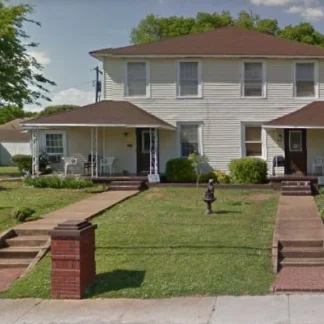Therapy Options
Therapy Options is a private rehab located in Huntsville, Alabama. Therapy Optio...
Pathfinder is a drug and alcohol rehab facility for men based in Huntsville, Alabama. The facility dedicates its services to men, helping them recover from drug and alcohol addictions and providing additional resources.
With a focus on personalized care and compassionate support, Pathfinder offers a structured residential program phase system that supports men on their journey toward lasting sobriety. This evidence-based approach allows individuals to progress through different phases which include:
During the initial phase, individuals receive a thorough assessment to determine their unique treatment requirements. The focus is on stabilization, establishing a strong therapeutic alliance, and engaging individuals in foundational life skills. Education about addiction and recovery is provided, along with personalized care planning.
In the second phase, individuals actively participate in evidence-based therapies, counseling sessions, and skill-building activities. Participants develop coping strategies, address underlying issues contributing to addiction, and acquire tools for relapse prevention. Collaborative treatment planning and ongoing evaluation ensure tailored care.
As individuals progress to the third phase, they gain greater independence and responsibility in their recovery journey. This phase emphasizes relapse-prevention techniques, life-skills development, and enhancing social support networks. The focus is on preparing individuals for successful reintegration into their daily lives.
The final phase, aftercare, assists individuals as they transition out of formal treatment. The Pathfinder staff provide ongoing support, access to alumni programs, relapse-prevention resources, and community-based support networks to help individuals maintain their recovery long term.
Contact us for more information: (256) 534-7644

Connect with Pathfinder by calling their admissions team directly.
(256) 534-7644 Website Get DirectionsCognitive Behavioral Therapy (CBT) is a therapy modality that focuses on the relationship between one's thoughts, feelings, and behaviors. It is used to establish and allow for healthy responses to thoughts and feelings (instead of unhealthy responses, like using drugs or alcohol). CBT has been proven effective for recovering addicts of all kinds, and is used to strengthen a patient's own self-awareness and ability to self-regulate. CBT allows individuals to monitor their own emotional state, become more adept at communicating with others, and manage stress without needing to engage in substance abuse.
Group therapy is any therapeutic work that happens in a group (not one-on-one). There are a number of different group therapy modalities, including support groups, experiential therapy, psycho-education, and more. Group therapy involves treatment as well as processing interaction between group members.
In individual therapy, a patient meets one-on-one with a trained psychologist or counselor. Therapy is a pivotal part of effective substance abuse treatment, as it often covers root causes of addiction, including challenges faced by the patient in their social, family, and work/school life.
Life skills trainings involve all the skills a person must have in order to function successfully in the world. These include time management, career guidance, money management, and effective communication. Truly successful addiction recovery is based on the ability to not only live substance-free, but to thrive. Life skills teaches the practical necessities of functioning in society, which sets clients up for success in life, and therefore sobriety.
Group therapy is any therapeutic work that happens in a group (not one-on-one). There are a number of different group therapy modalities, including support groups, experiential therapy, psycho-education, and more. Group therapy involves treatment as well as processing interaction between group members.
In individual therapy, a patient meets one-on-one with a trained psychologist or counselor. Therapy is a pivotal part of effective substance abuse treatment, as it often covers root causes of addiction, including challenges faced by the patient in their social, family, and work/school life.
Life skills trainings involve all the skills a person must have in order to function successfully in the world. These include time management, career guidance, money management, and effective communication. Truly successful addiction recovery is based on the ability to not only live substance-free, but to thrive. Life skills teaches the practical necessities of functioning in society, which sets clients up for success in life, and therefore sobriety.
In individual therapy, a patient meets one-on-one with a trained psychologist or counselor. Therapy is a pivotal part of effective substance abuse treatment, as it often covers root causes of addiction, including challenges faced by the patient in their social, family, and work/school life.
Life skills trainings involve all the skills a person must have in order to function successfully in the world. These include time management, career guidance, money management, and effective communication. Truly successful addiction recovery is based on the ability to not only live substance-free, but to thrive. Life skills teaches the practical necessities of functioning in society, which sets clients up for success in life, and therefore sobriety.
Life skills trainings involve all the skills a person must have in order to function successfully in the world. These include time management, career guidance, money management, and effective communication. Truly successful addiction recovery is based on the ability to not only live substance-free, but to thrive. Life skills teaches the practical necessities of functioning in society, which sets clients up for success in life, and therefore sobriety.
Therapy Options is a private rehab located in Huntsville, Alabama. Therapy Optio...
BHG Huntsville Treatment Center is a drug and alcohol rehab in Huntsville, Alaba...
Army Substance Abuse Program – ASAP is a public rehab located in Huntsville, Ala...
AA – Alcoholics Anonymous – Central Office is a drug and alcohol recovery suppor...